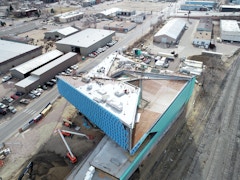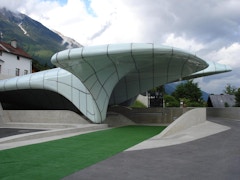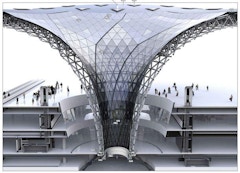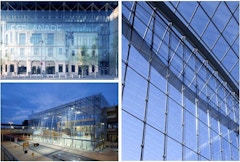
138 results
-
 Stainless steel has been successfully used in building envelopes since the completion of the Chrysler building in 1928. Today, it is used as both a…
Stainless steel has been successfully used in building envelopes since the completion of the Chrysler building in 1928. Today, it is used as both a… -

Influence of Facade Materials on the Acoustic Environment
- Paper by Alvaro Balderrama, M.Eng. LEED Green Associate · Daniel Arztmann, Prof. Dipl-Ing. M.Eng. · Jens-Uwe Schulz, Prof. Dipl-Ing.
Urban noise pollution is a major environmental health problem. International organizations are making efforts to prevent health damage due to high
-

Sustainable Silicone
- Paper by Jon Kimberlain · Adrienne Bowman-Grittini · Stanley Yee
Silicone materials have a long history in high performance building projects. Known for durability, they can reduce a building’s carbon footprint by
-

Heat-actuated Auxetic Facades
- Paper by Amira Abdel-Rahman · Elnaz Tafrihi
Highly transformable materials can be used as adaptive exterior shading systems by leveraging the relationship between external stimuli (heat) and
-
Effective Facade Modularization
- Paper by Kais Al-Rawi
Facade systems of various transparent and opaque materials and systems are increasingly becoming integrated components of modularized facade
-
Connections – Tolerance, Adjustability, Geometric Accuracy
- Paper by Jeff Montague, RA · Scott Abukoff
Connections, those transitions between systems and materials, are critically important when the surfaces are curved or complex. Well-designed
-

Pioneering the Structural Terracotta Mullion Façade
- Paper by Victoria Ereskina · John Neary
Architects today must explore alternative enclosure materials to meet evolving energy codes and embodied carbon regulations. Terra cotta has been
-
The Tectonics of Flimsiness
- Paper by Timothy Brown AIA NCARB CSI
Architecture has traditionally celebrated the joining of two building components or materials. Joinery serves as a key site for architectural
-
Form as Energy
- Paper by Matthew Fineout
All too often, high-performance building envelopes are considered in terms of new materials and technologies that push specific systems to improve
-

Curved Forming Panel Facades
- Paper by Roger Schroeder,
The performative and visual aspects of curved forming/bending thin “formable” planar materials is explored. Early tests for deflection indicate that… -
Adaptive Facades
- Paper by Walter Haase · Werner Sobek · Enrica Oliva · Michele Andaloro
Facade engineering aims at appropriately balancing the demands imposed by the context and the capabilities inherent to the materials, the geometries
-

Digital Enablement for Manufacturing
- Paper by Melody Rees
Architectural design freedom achieved on high-end projects currently costs over $1,000/sq. Ft. Building materials have long been relegated to plane
-

Thermoelectric Facades
- Paper by Ajla Aksamija, PhD, LEED AP BD+C, CDT · Zlatan Aksamija, PhD · Mahsa Farid Mohajer · Meenakshi Upadhyaya · Guy Vigneau
This article discusses design, prototype development and a simulation study of novel types of facade systems, which integrate thermoelectric (TE)
-

Solid Surface Material for Facades
- Paper by Christopher Payne, AIA, LEED AP, Associate
Navigating the building code, while challenging in any respect, can be even trickier when considering the use of emerging materials on building… -
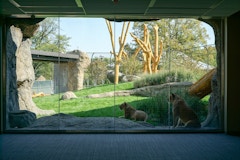
Go Big or Go Home!
- Paper by Patrick Loughran, FAIA, PE, LEED AP · Richard Barrett, AIA
This paper will focus on the design and detailing of large-format glass enclosures intended to maximize transparency using state-of-the-art materials
-
Advances in Laminated Glass Engineering
- Paper by Richard Green PE (WA, NY, TX, CO, OR, MT), M.IEAUST CPEng, NER(Aus), APEC Engineer, IntPE(Aus), RBP(Vic)
The stability of monolithic glass fins is reasonably well defined; as an elastic material it behaves in a similar manner to other elastic materials
-

Effect of Thermal Bridging on Buildings' Energy Performance
- Paper by Mahsa Farid Mohajer · Ajla Aksamija
Heat transfer through building facades can occur by any combinations of conduction, convection, and/or radiation. Conductive heat transfer depends on
-

Low-Carbon Cladding and Shading Design
- Paper by Prateek Jain, LEED · Isabelle Hens, LEED GA, WELL AP, EIT
In the last few years, the design community has embraced the challenge of reducing embodied carbon in buildings. Several tools are now available for
-
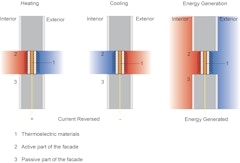
Novel Active Facade Systems and Their Energy Performance in Commercial Buildings
- Paper by Ajla Aksamija · Mahsa Farid Mohajer · Zlatan Aksamija
This article presents results of a research study that focuses on understanding energy performance of novel facade systems that integrate
-
Contextualizing Glass and Carbon Impacts
- Paper by Kayla Natividad, PhD, WELL AP, LEED Green Associate · Kyle Sword
Climate change goals will require significant improvements in the way buildings are constructed and operated. Building reuse can combat climate
